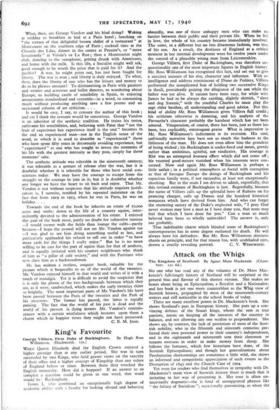King's Favourite
George Villiers, First Duke of Buckingham. By Hugh Ross Williamson. (Duckworth. 15S.) WHEN Queen Elizabeth died the English Crown enjoyed a higher prestige than at any earlier period. She was in turn succeeded by two Kings, who held graver views on the sanctity of their office and a higher concept of Kingship than any rulers of England before or since. Between them they wrecked the English monarchy. How did it happen? If an answer to so complex a question could be given in one word, that word would be : Buckingham.
James I, who combined an exceptionally high degree of academic ability with a faculty for looking absurd and behaving
absurdly, was one of those unhappy men who can make no barrier between their public and their private life. When he fea
in love, the whole of his country became immediately involved, The same, in a different but no less disastrous fashion, was true of his son. As a result, the destinies of England at a critical moment in her internal development were for twelve years under the control of a plausible young man from Leicestershire.
George Villiers, first Duke of Buckingham, was therefore un- questionably one of the most important figures in English history, Mr. Ross Williamson has recognised this fact, and set out to give a succinct account of his rise, character and influence. With an intelligence and address reminiscent of Diane de Poitiers, Villiers performed the complicated feat of holding two successive Kings in thrall, providently gaining the allegiance of the son while the father was yet alive. It cannot have been easy, for while with James he had to be always the cajoling, slightly skittish, "slave and dog Steenie," with the youthful Charles he must play the sage elder brother, all understanding and good advice. For this kind of ability Mr. Ross Williamson gives Villiers full credit ; his criticism otherwise is damning, and his analysis of the Favourite's character probably the harshest which has yet been uttered. Vituperation, of course, there has been, just as there has been, less explicably, extravagant .praise. What is impressive in Mr. Ross Williamson's indictment is its restraint. His cool, unfriendly narrative lays bare not so much the badness as the littleness of the man. He does not even allow him the grandeur of being wicked ; his Buckingham is under-bred and mean, greedy rather than ambitious, spiteful, not vindictive. His courage at Rhe was an attempted bravura effect which did not come off ; his vaunted good-nature vanished when his interests were con- cerned. Now and again Mr. Ross Williamson is perhaps a little unfair ; in a political atmosphere as foetid with corruption as that of baroque Europe the doings of Buckingham and his rapacious family were, if not excusable, at least not exceptionally shocking. But in the main I am driven to admit, regretfully, that this revised estimate of Buckingham is just. Regretfully, because the name of Villiers calls up the splendid hero of Rubens on his prancing charger, calls up Dumas and the hundred historical romances which have derived from him. And who can forget the stuttering outcry of the Duke's neglected wife, "I pray God never woman may love a man as I have done you, that none may feel that which I have done for you." Can a man so much beloved have been so wholly unlovable? The answer is, only too probably.
That indefinable charm which blinded some of Buckingham's contemporaries has in some degree outlasted his death. He will always have his defenders. But Mr. Ross Williamson distrusts charm on principle, and for that reason has, with undeluded eyes,
drawn a cruelly revealing portrait. C. V. WEDGWOOD.


































 Previous page
Previous page